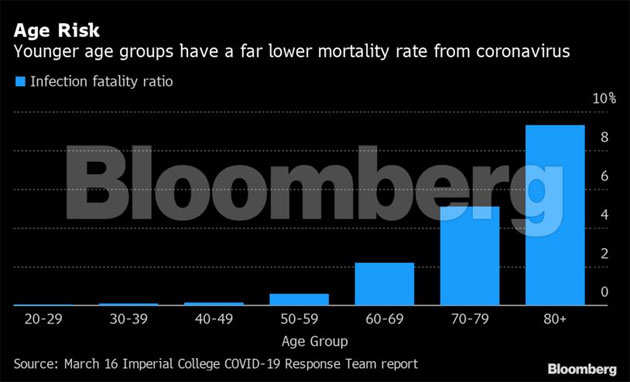[ad_1]
As global governments grapple with how to unlock economies without triggering another round of coronavirus infections, some economists are recommending that age should be used to determine who returns to work first.
While the freezing of activity from Mumbai to Chicago is credited with saving lives, the downsides are evident in the International Monetary Fund’s warning of the worst global recession in almost a century.
How to balance lives and livelihoods is drawing the attention of economists, and a growing cohort propose authorities should first remove restrictions on those deemed at lowest risk of death or hospital admittance from the infection.
Age Risk
That means the youngest are activated first, while more venerable groups remain sheltered until either a vaccine can be administered or the rest of the population develops sufficient immunity. One calculation of fatalities from the disease by Imperial College in London is for 0.03% of those in their 20s, compared to over 5% among the over 70s.
“Age- and morbidity-related restrictions would allow a rapid return of economic activity,” according to David Mackie, chief European economist at JPMorgan Chase & Co in London. “If mixing between the elderly and the less vulnerable younger populations can be sufficiently reduced, the economy and society can get back to work quickly.”
His research suggests governments could ease restrictions on those under 60 and without additional risk factors, yet still limit deaths and pressure on health systems.
Bloomberg

Economists from Warwick University argue that releasing the more than 4 million British residents in their 20s who do not live with their parents could have “substantial economic and societal benefits without enormous health costs.” They propose the idea could then be applied to other countries.
The young are already feeling the most pain of the lockdown, according to a study this week by two regional Federal Reserve banks. The paper calculated that the costs of reduced economic activity “are disproportionately borne by younger households, which bear the brunt of lower employment.”
However, focusing on young workers is not without risks, aside from the potential threat to their health.
Citigroup Inc. economists Dana Peterson and Catherine Mann argue that this population segment is less likely to have health insurance, and any boost to growth from its participation will be limited without the workplace input and buying power of the older, richer generation. Such a strategy also places a burden on one age group to carry the entrepreneurial load of emerging from the shutdown, and assumes the everyone else is willing to play ball.
Quality of Life
On Friday, economists from the London School of Economics called for an approach that doesn’t distinguish between age per se, but assesses collectively the length of people’s lives and the quality of that experience, to determine when to end a lockdown.
Many countries have already eased restrictions on education and some businesses in an effort to gradually reopen economies. One strategy proposed by University College London suggests a staggered release of the U.K. lockdown over six weeks with strict social distancing, compulsory masks on public transport and varying business opening hours to avoid rush hour crowding.
Bloomberg

Ultimately however, any proposal by economists is ultimately about devising the optimal stopgap that maximizes growth with the fewest possible deaths until a solution to the virus is found.
A vaccine would be one such a solution. At least three projects for that are now in human testing, according to the World Health Organization. Yet even in a best-case scenario, developing a safe and effective inoculation may take at least a year.
The Journey to Herd Immunity
Alternatively, enough healthy people would survive the disease that the population itself becomes immune, the controversial concept of herd immunity. The U.K abandoned that strategy early in the pandemic after projections showed its health care system would be overwhelmed, but now it’s regaining traction in poor but young countries such as India.
Such a trade-off could still prove unacceptable for many governments. The Warwick University economists estimate their plan for the U.K. could generate around 13 billion pounds ($16 billion) in annual extra income, but also up to 630 additional premature deaths among the 20-30s age group if they no longer have to stay home — a price tag that not all electorates would support.
“There is obviously going to be conflict between the relatively early relaxation of the restrictions and allowing the economy to breathe, and putting people at risk,” said Philip Shaw, chief economist at Investec Bank Plc. “At the end of the day, you’re making horrible decisions.”
[ad_2]
Source link